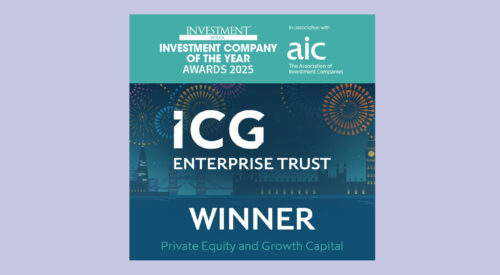Private equity is all around us. In the UK alone there are over 4,300 private equity-backed companies, more than double the number of listed companies.
About private equity investment trusts
Private equity or PE is a term used to describe investment in private, unquoted companies (those not listed on a stock exchange).
An investment trust is a company listed on the London Stock Exchange that sells shares to investors and then invests its shareholders’ capital in other companies.
A private equity investment trust is listed on the London Stock Exchange and invests its shareholders’ funds in unquoted companies.
Jump to:
Our purpose at ICG Enterprise Trust is to provide shareholders with access to the attractive long-term returns generated by investing in private companies, with the added benefit of daily liquidity
About private equity
Private equity is a term used to describe investment in private, unquoted companies
The term private equity covers a wide spectrum of investments, from early-stage investment in start-up companies (venture capital) to acquisitions of larger established companies of all sizes (buyouts). ICG Enterprise Trust (ICGT) focuses on buyouts. We believe this part of the market enables us to meet our objective of generating strong and consistent returns for our shareholders, while limiting downside risk.
What is a buyout?
A buyout typically involves the purchase of a majority or a significant minority of the equity of a well-established, profitable company by one or more private equity funds. These PE funds invest either:
- Alongside the existing management team (a Management Buyout or MBO), or
- With a new management team (a Management Buyin or MBI).
The sellers may be the founders or other individuals. They may also be larger companies seeking to divest subsidiaries or another private equity firm selling an investment (known as a secondary investment).
Quoted companies may also be acquired by private equity investors in public to private transactions.

How private equity creates value
An active ownership model driving returns well in excess of public markets
Private equity and venture capital-backed companies are all around us, touching our everyday lives from food and consumer goods, to healthcare services, software, travel and leisure. Most sectors in almost every developed economy have companies owned and funded through private markets investment.
Meet private equity-backed companies in this series of short videos by Invest Europe and BBC StoryWorks
Why private equity?
With many of the world’s largest and most sophisticated institutional investors and pension funds increasingly allocating capital to private equity, the asset class has gone from alternative to mainstream. Data and insights firm Prequin forecasts that private equity assets under management (AUM) will grow from $4.2 trillion in 2021 to $7.6 trillion globally by December 2027.
Investors are attracted by both the potentially higher returns on offer and the wider opportunity set available, as the number of companies in private markets far outweighs those on public markets.
How does private equity create value?
Private equity is an active ownership model, with managers typically acquiring controlling stakes in companies and creating value by growing and improving them. Key drivers of performance include:
- An active and hands-on approach
- A long-term investment horizon
- A focused stakeholder group with strong alignment of interests
- An extensive due diligence process
- Strong governance and responsible investing
- Exit planning
What does an active and hands-on approach involve?
When you invest in private equity, you are investing in the skills and expertise of the manager to identify and work with companies to unlock growth. Managers are actively involved in the running of the businesses they invest in, directing them through board representation and governance rights as well as, typically, through majority shareholdings.
Strategic change
Strategic repositioning can include expansion into new markets or business lines, rolling out sites or growing companies through acquisition. Private equity managers use their commercial acumen to direct management to prioritise strategies that maximise long-term value.
Operational improvement
Most leading private equity managers have in-house specialist teams whose sole focus is to work with company management teams to maximise efficiencies and drive sustainable growth. Examples include improving procurement, sales force effectiveness and optimising operating models. Close lines of communication mean that any issues can be identified early and action taken to preserve value.

Financial discipline
Private equity managers bring significant financial and capital markets expertise. They ensure companies have access to competitive financing solutions and the right capital structure to withstand economic uncertainty. They also encourage discipline with respect to capital expenditure decisions and working capital management.
In a short article, Colm Walsh, Managing Director, looks at private equity investments in troubled times from pandemics to global financial crises:
Investing in private equity
Traditional private equity funds are difficult for most private investors to access. Minimum commitment sizes are typically at least £5m. The institutional investors involved who may be pension and insurance firms, family offices and sovereign wealth funds, commit to a long-term obligation to fund a private equity manager’s investment programme. The manager is known as the general partner (GP).
Private equity is an illiquid asset class and traditionally equity funds are difficult for most private investors to access. The commitment is typically through a 10-year limited partnership (LP) fund, with a five-year investment period. It requires careful management of cash resources to ensure that all commitments can be met. It can also be difficult to sell fund interests, as secondary market liquidity can be limited.
Selecting a private equity manager
Like all asset classes, manager selection is key. However, unlike traditional asset classes such as equities or bonds, the dispersion of returns in private equity is far more pronounced. Historically, top performing private equity managers have materially outperformed public markets; the same cannot always be said for median or poorer performing managers. To safeguard against mediocre returns, extensive due diligence on the private equity manager is essential, comprising its:
Strong relationships with funds managed by top performing firms, which are often oversubscribed and hard to access.

Listed private equity firms can be considered ‘evergreen’. They reinvest the proceeds from the sale of investments, free of capital gains tax, into new investments. This can compound returns and can provide shareholders with long-term capital appreciation.
Recognising the importance of a reliable source of income for shareholders, some listed private equity companies pay dividends from realised capital profits. This allows their shareholders to participate, to some degree, directly in the proceeds of the realisations from the underlying portfolios. The long-term horizon of private equity means that listed private equity is best suited to long-term holding, rather than frequent trading.
Finally, investment trusts listed on the London Stock Exchange are supervised by boards of directors. They are typically all independent of the investment team and oversee the manager’s accountability to shareholders.

























 Back
Back